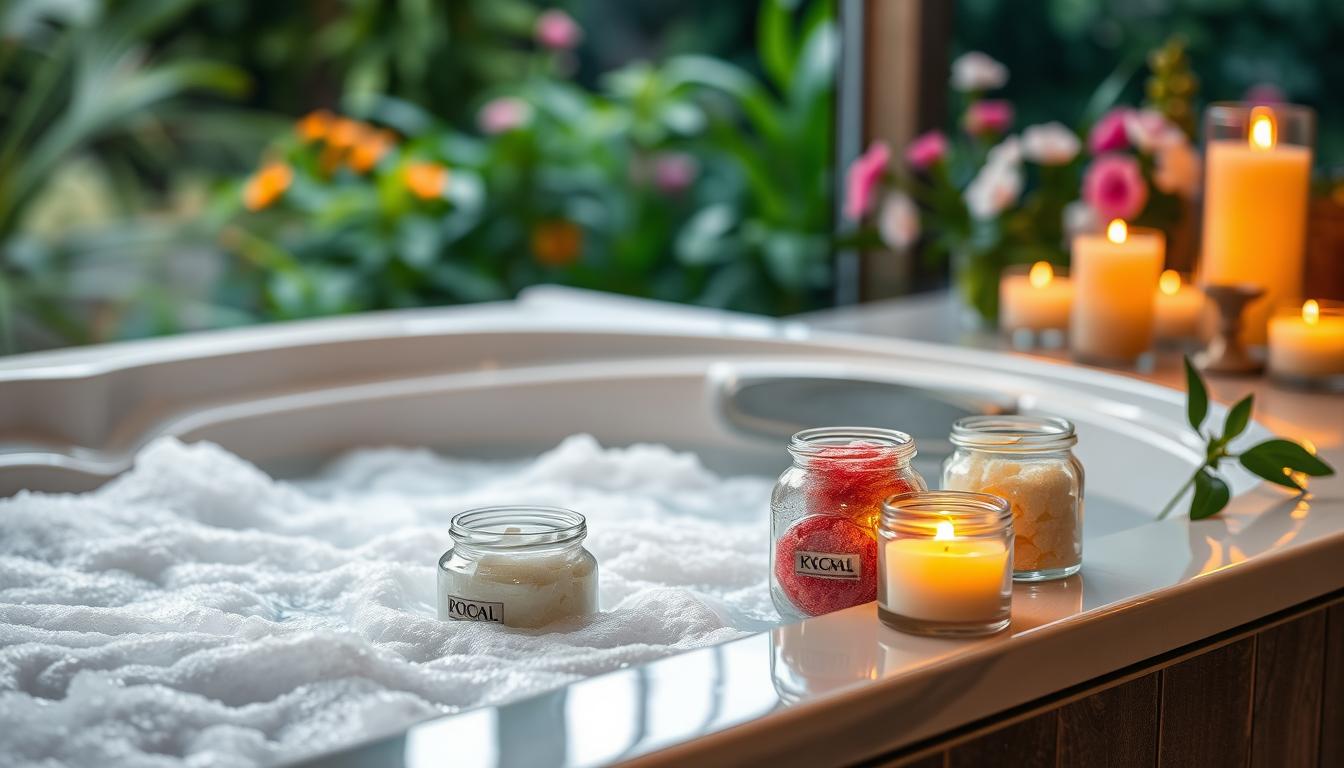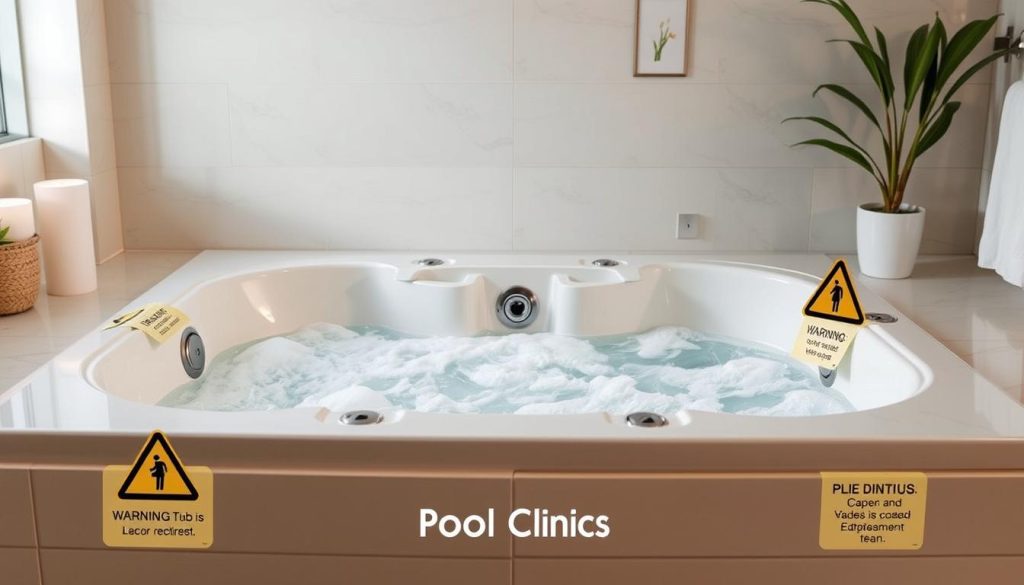
Soaking in a jetted tub can melt away stress and soothe sore muscles. Many of us love adding bath salts for extra luxury. But are they safe for your jetted tub?
Using the wrong products can cause clogs and damage. It may also lead to extra cleaning. Let’s explore which ingredients are safe for jetted tubs and which to avoid.
We’ll share tips on making tub-friendly bath salts at home. This way, you can enjoy a spa-like experience without harming your tub.
Key Takeaways
- Jetted tubs require special care when using bath salts to avoid clogs and damage.
- Foaming agents, oil-based additives, and large particles should be avoided in jetted tubs.
- Epsom salts and baking soda are safe and beneficial for use in jetted tubs.
- Regular cleaning and maintenance are crucial for keeping your jetted tub in top condition.
- Creating your own jetted tub-safe bath salts is easy with the right ingredients and proportions.
Understanding Your Jetted Tub
Jetted tubs offer a luxurious and therapeutic bathing experience. They’re effective for relieving pain and stiffness for 85% of users. Many doctors recommend hydrotherapy jets for various health conditions.
In Orlando, FL, 75% of homeowners want to add hydrotherapy jets to their baths. This shows the growing popularity of jetted tubs among homeowners.

How Jetted Tubs Work
Jetted tubs use pumps and motors to push water through small jets. These jets are placed around the tub to create a massaging effect. This can improve circulation, relieve muscle tension, and promote relaxation.
You can adjust the jets to control the water flow’s intensity and direction. This allows for a customized bathing experience that suits your needs.
Importance of Using the Right Products
Using the right products is crucial for your jetted tub’s longevity. Avoid oil-based soaps, bubble baths, and additives that can cause residue build-up. These products can clog the jets and harm the system.
Instead, use low-foaming bath salts made for jetted tubs. These dissolve completely and won’t create excessive bubbles that can damage the plumbing.
Maintaining Your Jetted Tub
Regular maintenance keeps your jetted tub in top condition. Follow these tips for the best results:
- Clean the tub surface with a non-abrasive cleaner and soft cloth to avoid scratching.
- Use a mixture of baking soda and hydrogen peroxide to remove stubborn stains.
- Perform a monthly cleaning routine using dishwasher powder and vinegar to keep the tub clean and pipes clear.
- Run the water jets for 10-15 minutes, drain, and refill with cold water to ensure thorough cleaning.
- Treat hard water by adding vinegar during the cleaning process, but avoid mixing it with bleach or other household cleaners.
| Hydrotherapy Bath Enclosure Type | Average Cost |
|---|---|
| Jetted Tub | $1,500 – $5,000 |
| Whirlpool Tub | $2,000 – $6,000 |
| Walk-in Tub with Jets | $3,000 – $10,000 |
| Steam Shower | $2,500 – $8,000 |
Proper care ensures you can enjoy your jetted tub’s benefits without issues. Over 50 bathroom remodelers in Orlando offer services for jetted tubs and spas.
More people are subscribing to Luxury Bath of Central Florida’s blog for hydrotherapy info. This shows the rising demand for these luxurious bath enclosures.
Bath Soak Ingredients to Avoid
Choosing the right bath salt ingredients for your jetted tub is crucial. Some additives can relax you and benefit your skin. Others may cause clogged jets or skin irritation from bath products.
Let’s explore ingredients to avoid when using your jetted tub. This will help ensure a peaceful and problem-free soak.
Foaming Agents
Foaming agents can cause issues in jetted tubs. They create too many bubbles that might overflow. These bubbles can leave stubborn residue in the jets, potentially clogging them.
Oil-Based Additives
Oil-based additives like bath oils create a slick film on the water. This film is hard to clean and can interfere with your tub’s function. Over time, it may compromise your jetted tub’s performance.
Large Particle Additives
Avoid additives with large particles in jetted tubs. Things like whole flower petals or chunky salts can easily clog jets and filters. This can lead to damage and expensive repairs.
Soap and Shampoo
Soap and shampoo are designed to lather, creating excessive foam. These bubbles can overwhelm your tub’s systems. They also leave behind residue that’s tough to remove.
Poorly Dissolving Salt Crystals
Choose finely milled, easily dissolving bath salts for your jetted tub. Salts that don’t dissolve well can build up in the tub. They might get sucked into the jets, causing blockages.
Synthetic Dyes and Colors
Synthetic dyes not made for baths can stain your tub. They might also react with the tub’s materials. Stick to bath products with natural, non-staining colorants.
Harsh Chemicals: Sulfates and Parabens
Harsh chemicals like sulfates and parabens can harm your jetted tub. They may also irritate your skin. Choose gentler, natural alternatives for a safe and enjoyable soak.
| Ingredient | Potential Issues |
|---|---|
| Foaming Agents | Excessive bubbles, residue, clogged jets |
| Oil-Based Additives | Slick film, difficult to clean, tub malfunction |
| Large Particle Additives | Clogged jets and filters, damage to tub |
| Soap and Shampoo | Excessive foam, residue buildup |
| Poorly Dissolving Salt Crystals | Accumulation, blockages, mechanical issues |
| Synthetic Dyes and Colors | Staining, reaction with tub materials |
| Harsh Chemicals (Sulfates, Parabens) | Damage to tub, skin irritation |
Check your jetted tub manufacturer’s guidelines before using any products. This helps avoid voiding the warranty or harming your tub. Choose jetted tub-safe alternatives for a luxurious, worry-free soak anytime.
can you use bath salts in a jetted tub
Certain bath salts can be safely used in air jetted tubs. They enhance the experience with therapeutic benefits without damaging the tub’s components. This allows us to unwind while enjoying the tub’s soothing massage features.
Epsom Salts: Muscle-Soothing and Easily Dissolvable
Epsom salts are ideal for jetted tubs because they dissolve quickly in water. These magnesium-rich salts are known for soothing muscles and reducing inflammation. They won’t leave residue or clog the air jets, keeping the tub in top condition.
Baking Soda: Water Softener and Skin Benefactor
Baking soda is a jetted tub-friendly ingredient that softens water. This helps bath salts dissolve more efficiently, especially in areas with hard water. Baking soda can also soothe irritated skin and provide relief from eczema and psoriasis.
Adding baking soda to bath salt blends creates a more balanced, skin-nourishing experience. It’s a simple way to enhance your bathing routine.
Citric Acid: Enhancing Solubility in Hard Water
Adding a small amount of citric acid to bath salts can improve their solubility in hard water. It breaks down mineral deposits that make it difficult for salts to dissolve properly.
Use citric acid sparingly and ensure it’s fully dissolved before entering the tub. When used correctly, it helps create a bath salt blend that dissolves effortlessly.
Essential Oils: Aromatherapy Without Foaming
Essential oils can be safely added to jetted tub-safe bath salts for aromatherapy benefits. Choose oils that won’t create foam or bubbles to protect the tub’s air jet system.
Lavender, chamomile, and eucalyptus are excellent non-foaming options for a relaxing bath. Always follow proper dilution guidelines and mix oils with bath salts before adding to water.
By prioritizing essential oil safety, you can enjoy therapeutic scents without compromising your jetted tub’s integrity. This creates a truly relaxing and rejuvenating experience.







